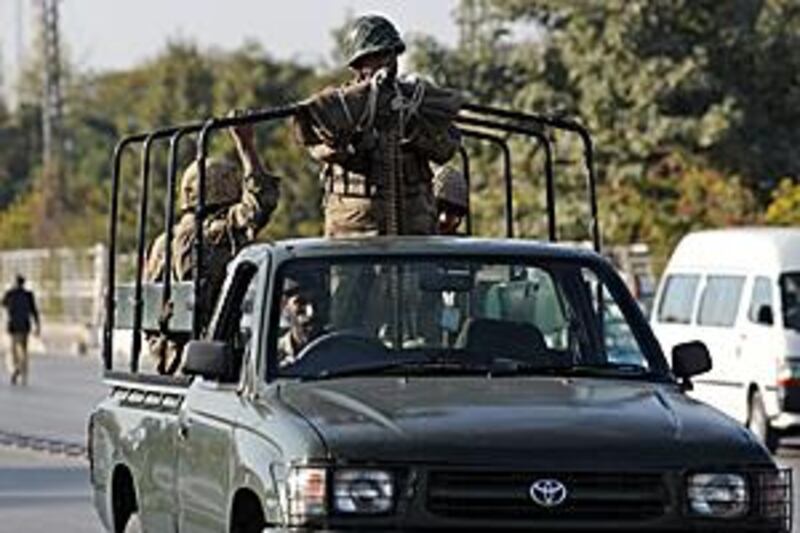LAHORE // Suspected Taliban gunmen lobbed grenades and opened fire on worshippers at a mosque popular with army officers near Pakistan's military headquarters yesterday, killing at least 40 people and wounding scores more. Two of at least four suspects then blew themselves up, according to police and government officials, causing the roof of the mosque to collapse, trapping dozens of people, many of them women and children. The attack in Rawalpindi, a garrison town just 30 minutes drive from the capital Islamabad, has raised fears that despite protracted counterinsurgency operations in Swat and the new offensive in Waziristan, the Taliban are still able to attack highly fortified buildings. Nasir Shahid said he was standing near the mosque when he heard the sound of an explosion. "I heard gunfire and then people screaming and saw them running out of the mosque," he said. Another witness, Malik Riaz, said he saw at least two gunmen run towards the mosque and begin firing. "I was in the distance when I saw them lifting up their guns and firing," he said. "I also saw clouds of smoke rising from the mosque." Major Gen Athar Abbas, the military spokesman, described the attack on the mosque as co-ordinated. "There was certainly more than one attacker, so there is a possibility that some of them may still be hiding in the vicinity," he told reporters. Rahman Malik, the interior minister, said four men had launched the attack and that two of them had detonated suicide vests while the other two had been killed in a shoot-out with security forces. "There were two suicide bombers who blew themselves up one after the other inside the mosque, causing the roof of the building to collapse," he said. Though the mosque was located on Parade Lane in proximity to a military hospital and housing colonies of army officers, security was minimal - as is the custom at most mosques in the country. A large number of those who died or were injured were members of the armed forces and their families. "There are children among them who had come to pray with their fathers. There are also elderly, retired security officials," Gen Abbas said. In recent months, the militants have increasingly shifted their focus of attacks to law enforcement agencies and security forces. In October this year, 19 people were killed when militants attacked the army base in Rawalpindi, sparking a day-long siege. On Wednesday, a man wearing a suicide vest approached a checkpoint outside a navy complex in Islamabad, blowing himself up and killing two naval policemen. The militants seem to be establishing a pattern of specifically targeting the military and police. Mr Malik said yesterday's assault was the militants' way of taking revenge. "They know that we are gaining success in our ongoing operation in Waziristan and they are making these last desperate attempts to fight back. "It is yet another sign that the government is doing a good job dealing with the militants." Rasool Baksh Raees, a political analyst, said the attack showed the Taliban was becoming increasingly desperate. "The Taliban realise that they are being decisively defeated in Waziristan and Swat and so they are now trying to fight back as desperately as possible. They are now resorting to attacking soft targets such as mosques with unarmed worshippers."
* The National





